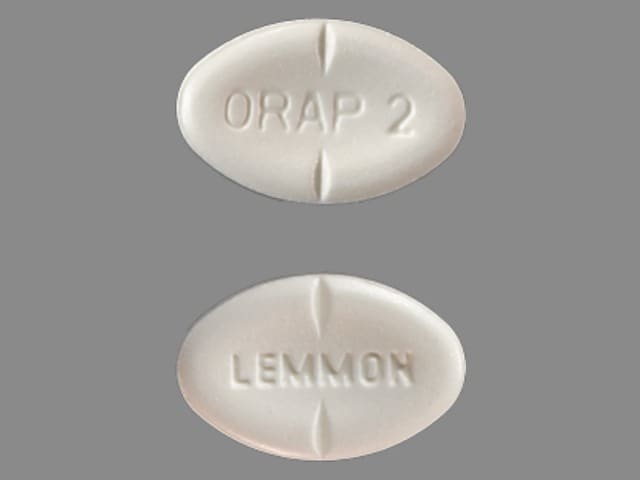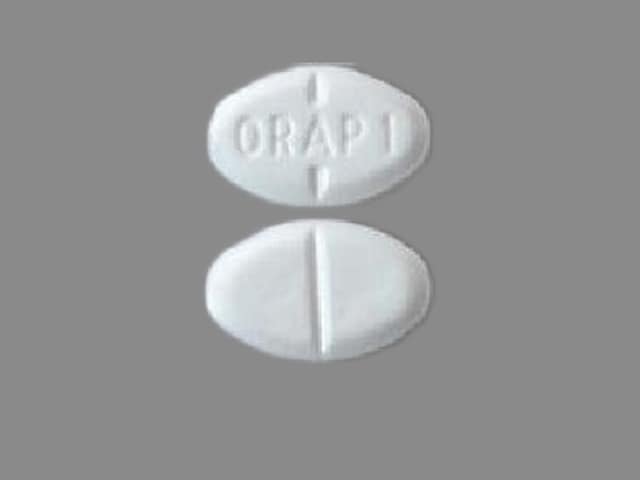Orap
Generic name: pimozide
Drug class: Miscellaneous antipsychotic agents
Medically reviewed by A Ras MD.
What is Orap?
Orap is a prescription medicine that is used to lower the number of tics in patients with Tourette’s syndrome. Orap may be given to you for other reasons.
Description
Orap (pimozide) is an orally active antipsychotic agent of the diphenyl-butylpiperidine series. The structural formula of pimozide, 1-[1-[4,4-bis(4-fluorophenyl) butyl]-4piperidinyl]-1,3-dihydro-2H-benzimidazole-2-one is:
 |
The solubility of pimozide in water is less than 0.01 mg/mL; it is slightly soluble in most organic solvents.
Each white ORAP tablet contains either 1 mg or 2 mg of pimozide and the following inactive ingredients: calcium stearate, microcrystalline cellulose, lactose anhydrous and corn starch.
Before taking Orap, tell your doctor:
- If you are allergic to Orap; any part of this medicine; or any other drugs, foods, or substances. Tell your doctor about the allergy and what signs you had.
- If you have tics that are caused by something other than Tourette’s disorder.
- If you have ever had a long QT on ECG or other heartbeat that is not normal.
- If you have any of these health problems: Low potassium or magnesium levels.
- If you are very sleepy.
- If you take any drugs (prescription or OTC, natural products, vitamins) that must not be taken with Orap, like certain drugs that are used for HIV, infections, or depression. There are many drugs that must not be taken with Orap. Your doctor or pharmacist can tell you if you are taking a drug that must not be taken with Orap.
- If you are taking any drugs that can cause a certain type of heartbeat that is not normal (prolonged QT interval). There are many drugs that can do this. Ask your doctor or pharmacist if you are not sure.
- If you are breast-feeding or plan to breast-feed.
This is not a list of all drugs or health problems that interact with this medicine.
Tell your doctor and pharmacist about all of your drugs (prescription or OTC, natural products, vitamins) and health problems. You must check to make sure that it is safe for you to take Orap with all of your drugs and health problems. Do not start, stop, or change the dose of any drug without checking with your doctor.
What are some things I need to know or do while I take Orap?
- Tell all of your health care providers that you take Orap. This includes your doctors, nurses, pharmacists, and dentists.
- Avoid driving and doing other tasks or actions that call for you to be alert until you see how Orap affects you.
- Have blood work checked as you have been told by the doctor. Talk with the doctor.
- Low white blood cell counts have happened with drugs like this one. This may lead to a higher chance of infection. Rarely, infections have been deadly. Tell your doctor if you have ever had a low white blood cell count. Call your doctor right away if you have signs of infection like fever, chills, or sore throat.
- Talk with your doctor before you drink alcohol or use other drugs and natural products that slow your actions.
- Avoid grapefruit and grapefruit juice.
- Be careful in hot weather or while being active. Drink lots of fluids to stop fluid loss.
- If you have been taking Orap on a regular basis and you stop it all of a sudden, you may have signs of withdrawal. Do not stop taking Orap all of a sudden without calling your doctor. Tell your doctor if you have any bad effects.
- An unsafe heartbeat that is not normal (long QT on ECG) has happened with Orap. Sudden deaths have rarely happened in people taking Orap. Talk with the doctor.
- You will need an ECG before starting Orap and during treatment. Talk with your doctor.
- This medicine may raise the chance of seizures in some people, including people who have had seizures in the past. Talk to your doctor to see if you have a greater chance of seizures while taking Orap.
- A very bad and sometimes deadly health problem called neuroleptic malignant syndrome (NMS) may happen. Call your doctor right away if you have any fever, muscle cramps or stiffness, dizziness, very bad headache, confusion, change in thinking, fast heartbeat, heartbeat that does not feel normal, or are sweating a lot.
- If you are 65 or older, use Orap with care. You could have more side effects.
- Tell your doctor if you are pregnant or plan on getting pregnant. You will need to talk about the benefits and risks of using Orap while you are pregnant.
- Taking Orap in the third trimester of pregnancy may lead to uncontrolled muscle movements and withdrawal in the newborn.
How is Orap best taken?
Use Orap as ordered by your doctor. Read all information given to you. Follow all instructions closely.
- Keep taking Orap as you have been told by your doctor or other health care provider, even if you feel well.
What do I do if I miss a dose?
- Take a missed dose as soon as you think about it.
- If it is close to the time for your next dose, skip the missed dose and go back to your normal time.
- Do not take 2 doses at the same time or extra doses.
What are the side effects of Orap that I need to call my doctor about immediately?
WARNING/CAUTION: Even though it may be rare, some people may have very bad and sometimes deadly side effects when taking a drug. Tell your doctor or get medical help right away if you have any of the following signs or symptoms that may be related to a very bad side effect:
- Signs of an allergic reaction, like rash; hives; itching; red, swollen, blistered, or peeling skin with or without fever; wheezing; tightness in the chest or throat; trouble breathing, swallowing, or talking; unusual hoarseness; or swelling of the mouth, face, lips, tongue, or throat.
- Signs of high or low blood pressure like very bad headache or dizziness, passing out, or change in eyesight.
- Trouble controlling body movements, twitching, change in balance, trouble swallowing or speaking.
- A heartbeat that does not feel normal.
- Chest pain or pressure or a fast heartbeat.
- Shakiness, trouble moving around, or stiffness.
- Seizures.
- Restlessness.
- Low mood (depression).
- Change in how you act.
- Change in eyesight.
- Trouble passing urine.
- Change in how often urine is passed.
- Not able to get or keep an erection.
- Lowered interest in sex.
- Some people may get a severe muscle problem called tardive dyskinesia. This problem may lessen or go away after stopping Orap, but it may not go away. The risk is greater with diabetes and in older adults, especially older women. The risk is greater with longer use or higher doses, but it may also occur after short-term use with low doses. Call your doctor right away if you have trouble controlling body movements or problems with your tongue, face, mouth, or jaw like tongue sticking out, puffing cheeks, mouth puckering, or chewing.
What are some other side effects of Orap?
All drugs may cause side effects. However, many people have no side effects or only have minor side effects. Call your doctor or get medical help if any of these side effects or any other side effects bother you or do not go away:
- Feeling sleepy.
- Feeling tired or weak.
- Constipation.
- Dry mouth.
- Upset stomach or throwing up.
- Not hungry.
- Not able to sleep.
- Headache.
- More saliva.
- Feeling nervous and excitable.
- Weight gain or loss.
- Dizziness.
These are not all of the side effects that may occur. If you have questions about side effects, call your doctor. Call your doctor for medical advice about side effects.
You may report side effects to the FDA at 1-800-332-1088. You may also report side effects at https://www.fda.gov/medwatch.
If overdose is suspected:
If you think there has been an overdose, call your poison control center or get medical care right away. Be ready to tell or show what was taken, how much, and when it happened.
Label


How do I store and/or throw out Orap?
- Store at room temperature.
- Protect from light.
- Store in a dry place. Do not store in a bathroom.
- Keep all drugs in a safe place. Keep all drugs out of the reach of children and pets.
- Throw away unused or expired drugs. Do not flush down a toilet or pour down a drain unless you are told to do so. Check with your pharmacist if you have questions about the best way to throw out drugs. There may be drug take-back programs in your area.
SRC: NLM .
